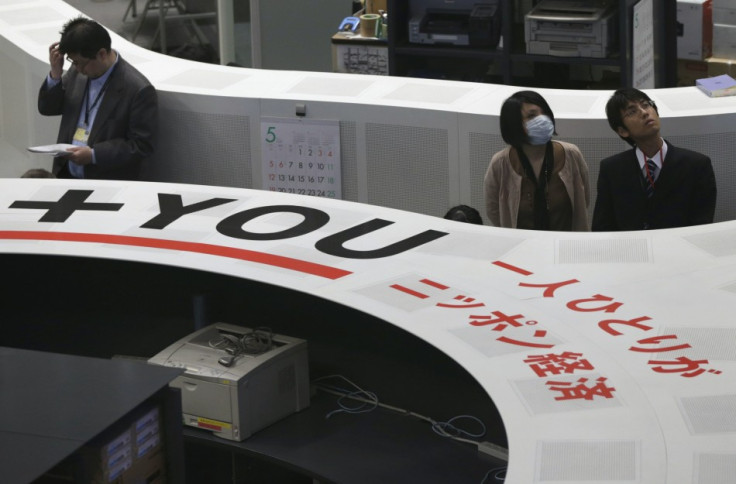Asian Markets Trade Lower While Nikkei Tanks After Wall Street Retreat

Asian markets opened lower after Wall Street indices retreated as investors tried to figure out the extent of damage the US Federal Reserve's potential rollback of global asset buys would have on the markets.
The Nikkei lead the pack, losing 3.57% or 512 points to 13814.46 after closing 0.1 higher on 29 May. China's Shanghai composite index was down 0.29% or 6.8 points to 2317.23.
Australia's S&P/ASX shed 1% or 51.6 points to 4923.10, while the Hang Seng was down 0.49% or 110.37 points to 22444.56.
But South Korea's Kospi inched up 0.10% or 2 points to 2003.18.
On Wall Street, Fed fears forced the Dow and the S&P 500 indices to shed 0.7% at the end of day's trade on 29 May, while the Nasdaq Composite was down 0.61%.
In Tokyo, exporters' stocks took a beating on currency fluctuations. Consumer electronics firms Pioneer plunged 5.5% while Sharp dropped 4%. Honda Motor lost 3%, while electronics and ceramics maker Kyocera was down 2.9%.
Realty stocks were down over concerns about Japanese government bond prices. Mitsui Fudosan dropped 5.3%, while Mitsubishi Estate was down 5.2%.
Telecoms firm NTT DoCoMo added 1.8%, supported by a price-target hike from HSBC. Oil firm Inpex inched up 0.2% on news that that it would, along with Royal Dutch Shell, buy out the Abadi offshore liquefied-natural-gas project from Indonesia's PT Energi Mega Persada. The Japanese government is Inpex's largest shareholder, with a 19% stake.
In Australia, a drop in iron-ore prices and slowing mining activity and investments pulled down mining stocks. Fortescue Metals Group plunged 6.2%, while the bigger players BHP Billiton and Rio Tinto lost 2.1% and 1.7% respectively.
Australian government data showed that mining activity in the resource-rich continent had peaked, and that A$150bn ($144bn) worth of resources projects have been either shelved or pushed back.
BlueScope Steel fell 4.1% after the data release. National Australia Bank lost 3.4% given that its shares traded without dividend rights.
In Hong Kong, realty stocks declined on concerns the government could further tighten policy in mainland China to cool rising property prices.
New World Development dropped 3.1%. Sino Land was down 1.2% while Gemdale lost 1.1% in Shanghai. China Vanke shed 0.7% in Shenzhen.
Airline shares suffered after the Wall Street Journal reported that China's aviation regulator has permitted two business groups to operate airlines.
In Hong Kong, leading mainland airline Air China lost 1.6%. China Southern Airlines was down 4.7%, while China Eastern Airlines lost 2.5%.
In Shanghai, however, Air China's stock remained flat. China Eastern shed 0.3%, while China Southern was down 0.2%.
In Shenzen, Chinese meat processor Shanghui group's stock shot up 7% after it announced it would buy out America's top pork producer Smithfield Foods for about $4.8bn.
In Taipei, a Dow Jones Newswires article that iPhone-maker Apple could shift production away from Foxconn Group pulled down the company's shares by 1.1%. But subsidiary Foxconn International Holdings gained 3.2% in Hong Kong because of its limited exposure to Apple.
Hon Hai Precision Industry, the world's top contract manufacturer of electronics by revenue, shed 1%.
In South Korea, consumer electronics firms Samsung Electronics added 2.1% while LG Display gained 2.7%.
Hana Financial Group was down 0.8% and Woori Finance Holdings shed 0.4%.
© Copyright IBTimes 2025. All rights reserved.




















